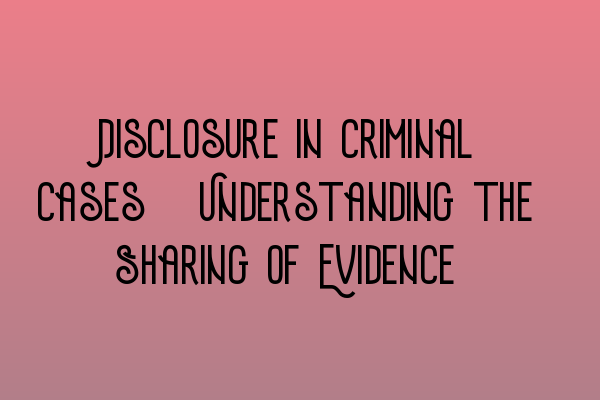Disclosure in Criminal Cases: Understanding the Sharing of Evidence
Gaining access to all relevant evidence is crucial in any criminal case. The process of disclosure ensures that both the prosecution and the defense have access to the evidence that will be presented in court. This blog post aims to demystify the concept of disclosure and shed light on its importance in criminal cases.
What is Disclosure?
Disclosure refers to the sharing of evidence between the prosecution and the defense in a criminal case. It is based on the principle of fairness, ensuring that both parties have equal access to the evidence. By disclosing all relevant evidence, the justice system seeks to promote a fair trial where all parties can present their case based on the same information.
The types of evidence that may be disclosed vary from case to case. It can include witness statements, CCTV footage, forensic reports, expert opinions, and any other material that could be relevant to the case. The prosecution has a duty to disclose any evidence that may assist the defense or undermine its own case.
The Importance of Disclosure
Disclosure plays a vital role in upholding the principles of justice. Without full disclosure, the balance of power between the prosecution and the defense can be disrupted, leading to an unfair trial. It allows the defense to explore and challenge the evidence presented by the prosecution, ensuring that all facts are examined thoroughly.
Furthermore, disclosure ensures that the accused has access to all the evidence that may support their defense. It enables them to make informed decisions about plea negotiations and trial strategy. By having access to all the evidence, the defense can identify any flaws, inconsistencies, or potential defenses in the prosecution’s case.
The Process of Disclosure
The process of disclosure typically starts early in a criminal case. The prosecution has an ongoing duty to disclose any new evidence that becomes available as the case progresses. This includes any evidence that may arise during the trial itself.
The defense also has an obligation to disclose any evidence it intends to rely on. The defense may have access to expert testimony, alibis, or any other evidence that supports their case. It is crucial for the defense to identify and disclose these materials to ensure a fair trial.
The disclosure process is governed by legal rules and guidelines. Both the prosecution and the defense must adhere to these rules to ensure the integrity of the trial. Failure to disclose evidence can have serious consequences and may lead to the exclusion of evidence or even case dismissal.
Conclusion
Disclosure is a fundamental aspect of criminal proceedings. It ensures that all parties involved have access to the relevant evidence, allowing for a fair trial. By understanding the importance of disclosure and the process involved, individuals can navigate the criminal justice system more effectively.
For more information on legal topics, check out these related articles:
- Demystifying the Solicitors Qualifying Examination Format
- LLC Formation Made Simple: Step-by-Step Guide for UK Entrepreneurs
- LLC Formation: A Step-by-Step Guide for UK Entrepreneurs
- Business Regulations in the UK: A Comprehensive Overview
- Decoding Corporate Structures: A Comprehensive Legal Insight
